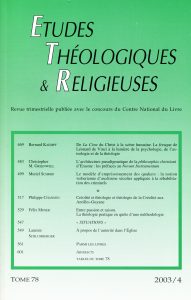Prenant le relais de la Négritude d’Aimé Césaire, l’émergence récente du mouvement de la Créolité porté par de brillants intellectuels antillais ne peut plus être ignorée par un christianisme créole déraciné de sa propre culture. Créolité et théologie doivent cependant régler et gérer un lourd héritage : celui du passé colonial esclavagiste dont l’Église fut complice. La Créolité a subverti l’obstacle en interceptant et en réinterprétant de manière inattendue tout le vocabulaire et les concepts biblico-théologiques du christianisme. Mais, comme le montre Philippe Chanson, de son côté, la théologie doit maintenant en prendre acte et chercher à engager le dialogue. Ce dernier promet d’être fécond tant leurs visées sont finalement convergentes.
Adopting the « Négritude », the Negro cultural and spiritual values of Aimé Césaire, the recent emergence of the « Creolity » (« Créolité » in french), the Creole movement led by brilliant French West Indies intellectuals can no longer be ignored by a Creole Christianity that is much too far removed from its own culture. Creolity and theology must, however, come to terms with a difficult inheritance – that of the past colonial slavery to which the Church was an accessory. The Creolity movement, by intercepting and reinterpreting the whole of the Christian theological vocabulary and its bible-based concepts, has overcome this obstacle in a truly remarkable way. Theological thought must now, however, take note of this and seek a dialogue. Given that their aims are ultimately identical this could only be fruitful and would enable a genuine Creole theology to become a reality.
p. 517-528
Auteur
CHANSON Philippe
Philippe CHANSON, docteur en anthropologie religieuse, théologien réformé, pasteur retraité, a été aumônier de l'Université de Genève.
